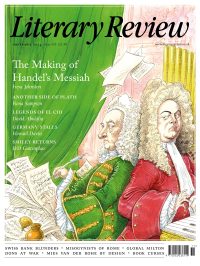Annika Mombauer
Scholars in Arms
Disputing Disaster: A Sextet on the Great War
By Perry Anderson
Verso 400pp £30
As E H Carr famously noted, ‘studying the historian’ is key to understanding how history is written. This is especially true when it comes to the debate over the origins of the First World War, a controversy that began before the first shots had even been fired in 1914 and rumbles on more than a hundred years later. After the war, historians, many in the pay of governments or motivated by a desire to continue the war on paper, published widely differing interpretations of how Europe went over the brink. The Treaty of Versailles contained the so-called ‘war-guilt clause’, which blamed ‘Germany and her allies’ for starting the war. This was the jumping-off point for those historians who believed that the Central Powers were predominantly to blame. ‘Revisionists’, meanwhile, argued that Germany was not responsible. With the passing of time, historians, increasingly free from nationalist sentiment but not necessarily from a burning desire to promote their own explanations, still could not agree on the culprits. The result is a bewildering number of interpretations. How is it possible that so many still exist, given that an abundance of archival evidence has long been available?
Perry Anderson’s Disputing Disaster addresses this question by considering the lives and works of six historians – ‘exemplary cases’. Readers who are new to the debate will find it interesting to see how many different histories of the same event came to written. Those who are already familiar with the authors discussed here will find plenty that is fresh and surprising in Anderson’s use of personal papers and archival sources in many different languages.
The six have been selected for the ‘impact’ they have had and for the ‘originality’ of their work. They comprise the doyen of French history Pierre Renouvin, the Italian politician and journalist Luigi Albertini, the German historian Fritz Fischer, the British historian Keith Wilson, the Australian historian Christopher Clark and

Sign Up to our newsletter
Receive free articles, highlights from the archive, news, details of prizes, and much more.@Lit_Review
Follow Literary Review on Twitter
Twitter Feed
In 1524, hundreds of thousands of peasants across Germany took up arms against their social superiors.
Peter Marshall investigates the causes and consequences of the German Peasants’ War, the largest uprising in Europe before the French Revolution.
Peter Marshall - Down with the Ox Tax!
Peter Marshall: Down with the Ox Tax! - Summer of Fire and Blood: The German Peasants’ War by Lyndal Roper
literaryreview.co.uk
The Soviet double agent Oleg Gordievsky, who died yesterday, reviewed many books on Russia & spying for our pages. As he lived under threat of assassination, books had to be sent to him under ever-changing pseudonyms. Here are a selection of his pieces:
Literary Review - For People Who Devour Books
Book reviews by Oleg Gordievsky
literaryreview.co.uk
The Soviet Union might seem the last place that the art duo Gilbert & George would achieve success. Yet as the communist regime collapsed, that’s precisely what happened.
@StephenSmithWDS wonders how two East End gadflies infiltrated the Eastern Bloc.
Stephen Smith - From Russia with Lucre
Stephen Smith: From Russia with Lucre - Gilbert & George and the Communists by James Birch
literaryreview.co.uk